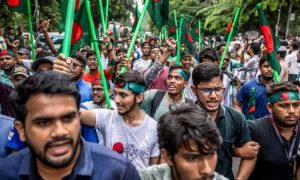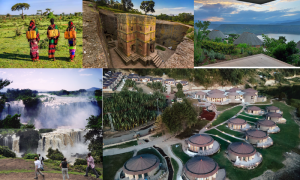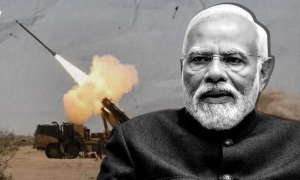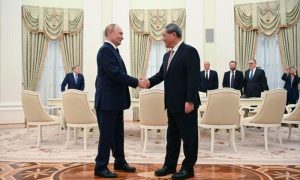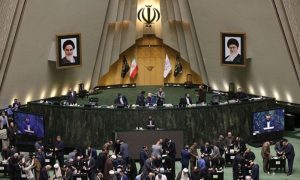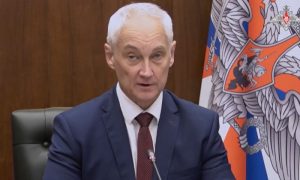Foreign Minister Ishaq Dar has made a significant peace offer to India. While speaking at 51st founding anniversary of the think tank Institute of Strategic Studies Islamabad (ISSI), he said “Pakistan does not believe in perpetual hostility. We seek good neighbourly relations with India on the basis of mutual respect, sovereign equality and peaceful resolution of the long-standing Jammu and Kashmir dispute”. This pleasant proposal is a source of satisfaction for saner peace-loving quarters of South Asia. It also carries more weight of seriousness because Foreign Minister Ishaq Dar is wearing the hate of the Deputy Prime Minister as well.
Timing of such a loud willingness for objective normalization of bilateral ties is also important on many accounts. The national election process in India is over. BJP under the leadership of Narinder Modi was aspiring for a decisive majority with four hundred plus seats. Though the BJP managed to form the government and Modi also secured the third term as PM the victory remained bittersweet and much short of the intended majority. Alliance “INDIA” predominately led by Congress made major dents in the political fortress of BJP. Normalization offer from Foreign Minister Ishaq Dar has followed the post-election victory congratulatory messages to Indian PM Modi from PM Shahbaz Sharif and PML-N supremo Nawaz Sharif.
The exchange of brief pleasantries on ‘X’ platform cannot be called icebreakers amid deeper bilateral tensions. No formal invitation to Modi’s oath-taking ceremony was extended to the Pakistani PM. Throughout the election campaign, Narinder Modi and BJP stalwarts played anti-Pakistan cards to charm the voters. Indian Defence Minister Rajnath Singh glorified the trans-nation killing spree of RAW with a threatening message pointed towards Pakistan. Likewise, PM Narinder Modi made a few derogatory speeches citing the economic deterioration of Pakistan as a taunt over nuclear capability. With this level of immature mindset prevailing in top tiers of Indian decision makers, expecting a rationality-based positive response from the Indian side seems to be misplaced optimism.
Despite provocative maneuvers and irresponsible fiery statements from BJP ministers, Pakistan has adopted a decent stance on bilateral normalization and regional peace. Deputy PM said ‘In our view, as the BJP-led NDA government starts a new term, it is time for a sober reflection on the future of India-Pakistan relations and cross-cutting issues affecting the entire region”. Stepping ahead for broader regional peace through formal diplomatic assertion has given a moral edge to Pakistan over apparently hostile and arrogant India. The ball is definitely in the Indian court. A specific response of Delhi on this issue would set the future course of bilateral normalization. This should be remembered that bilateral diplomatic ties were downgraded after the unilateral scrapping of Article 370 in 2019.
This article guaranteed the special statehood status to Indian Illegally occupied Jammu & Kashmir (IIOJK). Prior to the unilateral act of abrogation, India’s failed attempt of the surgical strike in Balakot and the jaw-breaking downing of Indian jets coupled with the arrest of fighter pilot Abhinandan further multiplied the longstanding tensions in February 2019. The floating of the peace proposal from the Pakistan side does not reflect any sign of backstepping from a principled stance on the Kashmir issue. It was made clear by the Foreign Minister that Pakistan wouldn’t submit to Indian hegemonic designs. Foreign Minister Ishaq Dar categorically warned, “We will also take every step needed to maintain strategic stability in South Asia and would respond effectively in a decisive way to any ill-considered military misadventure by the Hindutva-driven dispensation in New Delhi”. After taking the oath, PM Shahbaz Sharif also made a clear suggestion to settle the burning issues in peaceful manner.

Despite colder diplomatic ties, former foreign minister Bilawal attended the SCO meeting held in India. As compared to mature gestures from the Pakistan side, India could not reciprocate accordingly. Violating the basic norms of diplomatic hospitality, the Indian foreign minister behaved arrogantly with Pakistani counterpart Bilawal. Objective response is least expected from the Indian side due to some obvious ground facts. Pakistan has cited IIOJK as the core issue and demanded the restoration of the special statehood status of the disputed region. On the other hand, senior ministers of BJP had been threatening to take back the AJK and GB by force.
The use of cross-border terrorism as a tool of state policy against Pakistan is another big hurdle on the part of India. How one can ignore the recent press conference of the Interior Minister of Baluchistan which precisely disclosed the shocking details of RAW sponsored terror nexus comprising the banned TTP faction and BLA Majeed Brigade faction? After investing so much in anti-Pakistan terrorist groups, how India can move forward sincerely on any peace proposal made from Islamabad? Pakistan has once again acted in a responsible manner by extending an olive branch to a hostile neighbour like India whose fascist decision-makers are infected with the virus of Hindutva-driven extremism.













